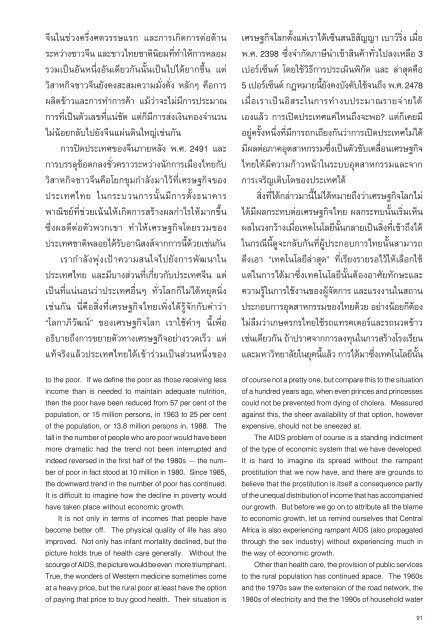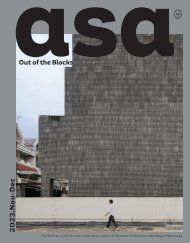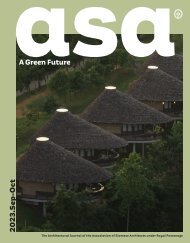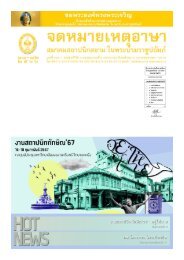บ้านเรือนถิ่นไทยในช่วงเจ็ดทศวรรษ 2489-2559
Create successful ePaper yourself
Turn your PDF publications into a flip-book with our unique Google optimized e-Paper software.
จีนในช่วงครึ่งศตวรรษแรก และการเกิดการต่อต้าน<br />
ระหว่างชาวจีน และชาวไทยชาตินิยมที่ทำให้การหลอม<br />
รวมเป็นอันหนึ่งอันเดียวกันนั้นเป็นไปได้ยากขึ้น แต่<br />
วิสาหกิจชาวจีนยังคงสะสมความมั่งคั่ง หลักๆ คือการ<br />
ผลิตข้าวและการทำการค้า แม้ว่าจะไม่มีการประมาณ<br />
การที่เป็นตัวเลขที่แน่ชัด แต่ก็มีการส่งเงินทองจำนวน<br />
ไม่น้อยกลับไปยังจีนแผ่นดินใหญ่เช่นกัน<br />
การปิดประเทศของจีนภายหลัง พ.ศ. 2491 และ<br />
การบรรลุข้อตกลงชั่วคราวระหว่างนักการเมืองไทยกับ<br />
วิสาหกิจชาวจีนคือโยกขุมกำลังมาไว้ที่เศรษฐกิจของ<br />
ประเทศไทย ในกระบวนการนั้นมีการตั้งธนาคาร<br />
พาณิชย์ที่ช่วยเน้นให้เกิดการสร้างผลกำไรให้มากขึ้น<br />
ซึ่งผลดีต่อตัวพวกเขา ทำให้เศรษฐกิจโดยรวมของ<br />
ประเทศชาติพลอยได้รับอานิสงส์จากการนี้ด้วยเช่นกัน<br />
เรากำลังพุ่งเป้าความสนใจไปยังการพัฒนาใน<br />
ประเทศไทย และมีบางส่วนที่เกี่ยวกับประเทศจีน แต่<br />
เป็นที่แน่นอนว่าประเทศอื่นๆ ทั่วโลกก็ไม่ได้หยุดนิ่ง<br />
เช่นกัน นี่คือสิ่งที่เศรษฐกิจไทยเพิ่งได้รู้จักกับคำว่า<br />
“โลกาภิวัฒน์” ของเศรษฐกิจโลก เราใช้คำๆ นี้เพื่อ<br />
อธิบายถึงการขยายตัวทางเศรษฐกิจอย่างรวดเร็ว แต่<br />
แท้จริงแล้วประเทศไทยได้เข้าร่วมเป็นส่วนหนึ่งของ<br />
to the poor. If we define the poor as those receiving less<br />
income than is needed to maintain adequate nutrition,<br />
then the poor have been reduced from 57 per cent of the<br />
population, or 15 million persons, in 1963 to 25 per cent<br />
of the population, or 13.8 million persons in, 1988. The<br />
fall in the number of people who are poor would have been<br />
more dramatic had the trend not been interrupted and<br />
indeed reversed in the first half of the 1980s – the number<br />
of poor in fact stood at 10 million in 1980. Since 1985,<br />
the downward trend in the number of poor has continued.<br />
It is difficult to imagine how the decline in poverty would<br />
have taken place without economic growth.<br />
It is not only in terms of incomes that people have<br />
become better off. The physical quality of life has also<br />
improved. Not only has infant mortality declined, but the<br />
picture holds true of health care generally. Without the<br />
scourge of AIDS, the picture would be even more triumphant.<br />
True, the wonders of Western medicine sometimes come<br />
at a heavy price, but the rural poor at least have the option<br />
of paying that price to buy good health. Their situation is<br />
เศรษฐกิจโลกตั้งแต่เราได้เซ็นสนธิสัญญา เบาว์ริ่ง เมื่อ<br />
พ.ศ. 2398 ซึ่งจำกัดภาษีนำเข้าสินค้าทั่วไปลงเหลือ 3<br />
เปอร์เซ็นต์ โดยใช้วิธีการประเมินพิกัด และ ล่าสุดคือ<br />
5 เปอร์เซ็นต์ กฎหมายนี้ยังคงบังคับใช้จนถึง พ.ศ. 2478<br />
เมื่อเราเป็นอิสระในการทำงบประมาณรายจ่ายได้<br />
เองแล้ว การเปิดประเทศแค่ไหนถึงจะพอ? แต่ก็เคยมี<br />
อยู่ครั้งหนึ่งที่มีการถกเถียงกันว่าการเปิดประเทศไม่ได้<br />
มีผลต่อภาคอุตสาหกรรมซึ่งเป็นตัวขับเคลื่อนเศรษฐกิจ<br />
ไทยให้มีความก้าวหน้าในระบบอุตสาหกรรมและจาก<br />
การเจริญเติบโตของประเทศได้<br />
สิ่งที่ได้กล่าวมานี้ไม่ได้หมายถึงว่าเศรษฐกิจโลกไม่<br />
ได้มีผลกระทบต่อเศรษฐกิจไทย ผลกระทบนั้นเริ่มเห็น<br />
ผลในวงกว้างเมื่อเทคโนโลยีนั้นกลายเป็นสิ่งที่เข้าถึงได้<br />
ในกรณีนี้ดูจะกลับกันที่ผู้ประกอบการไทยนั้นสามารถ<br />
ดึงเอา “เทคโนโลยีล่าสุด” ที่เรียงรายรอไว้ให้เลือกใช้<br />
แต่ในการได้มาซึ่งเทคโนโลยีนั้นต้องอาศัยทักษะและ<br />
ความรู้ในการใช้งานของผู้จัดการ และแรงงานในสถาน<br />
ประกอบการอุตสาหกรรมของไทยด้วย อย่างน้อยก็ต้อง<br />
ไม่ลืมว่าเกษตรกรไทยใช้รถแทรคเตอร์และรถนวดข้าว<br />
เช่นเดียวกัน ถ้าปราศจากการลงทุนในการสร้างโรงเรียน<br />
และมหาวิทยาลัยในยุคนี้แล้ว การได้มาซึ่งเทคโนโลยีนั้น<br />
of course not a pretty one, but compare this to the situation<br />
of a hundred years ago, when even princes and princesses<br />
could not be prevented from dying of cholera. Measured<br />
against this, the sheer availability of that option, however<br />
expensive, should not be sneezed at.<br />
The AIDS problem of course is a standing indictment<br />
of the type of economic system that we have developed.<br />
It is hard to imagine its spread without the rampant<br />
prostitution that we now have, and there are grounds to<br />
believe that the prostitution is itself a consequence partly<br />
of the unequal distribution of income that has accompanied<br />
our growth. But before we go on to attribute all the blame<br />
to economic growth, let us remind ourselves that Central<br />
Africa is also experiencing rampant AIDS (also propagated<br />
through the sex industry) without experiencing much in<br />
the way of economic growth.<br />
Other than health care, the provision of public services<br />
to the rural population has continued apace. The 1960s<br />
and the 1970s saw the extension of the road network, the<br />
1980s of electricity and the the 1990s of household water<br />
91


















